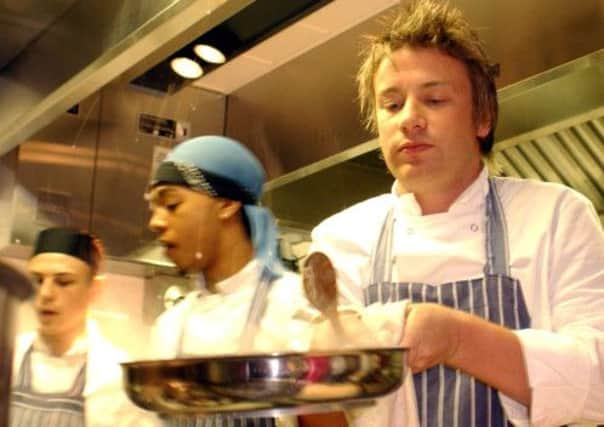Dani Garavellli: Oliver diet plea food for thought


From the minute he bounced on to our TV screens with his estuarine accent and pukka catchphrase, gushing about a sandwich he made for a friend as if he’d caught, gutted and smoked the salmon as opposed to just slapping it between two slices of ciabatta, his detractors have lined up to throw wet sponges at his cheery, puppy-dog face.
Oliver was easy to mock when he was in those awful Sainsbury’s adverts where he cuddled up to his nan. And he was easy to mock when he waged war on the Turkey Twizzler during his drive to improve school meals. As a nation we’re a cynical bunch and messianic zeal tends to get right up our noses.
Advertisement
Hide AdAdvertisement
Hide AdNow Oliver is being mocked for his pronouncements on the poor, and understandably so. Last week, the chef, who suffers recurring bouts of preachiness, chose to launch his latest series, Money Saving Meals by criticising the life-choices of those who live in Britain’s most deprived areas. Prefacing his diatribe with the ominous phrase, “I’m not judgmental”, he reminisced about a family from a previous series who ate chips and cheese out of Styrofoam containers despite owning “a massive TV”.
In an interview thick with disapproval, he went on to claim that, while in other countries some of the most “inspirational food” is created in the worst-off areas, poor people in the UK lack the will or know-how to create flavoursome dishes from stale bread and cheaper cuts of meat.
Much of what was wrong with the chef’s sermonising is self-evident.
Who gave smug multi-millionaire Oliver – with his wife, four children and house in the Home Counties – the right to tell the near-destitute how to spend what little they have? Oliver, whose oil is always olive and whose sausages are always good quality and bought from a butcher’s, is about as far removed from the experiences of ordinary people as it is possible to be.
Just how oblivious he is to the challenges of living on an estate is betrayed when he suggests that, instead of buying at Spar, people should go to their local market (not many of those in the schemes of Glasgow). But he’s blind to the psychological challenges too – the possibility that, when your life is one long endurance test, you might be sapped of the energy to cook; or that, as Alex Andreou put it, when you are faced with a daily list of No’s (“Cinema? No. Night out? No. New shoes? No”), saying yes to some small treat – even if it’s just chips and cheese – becomes a form of self-assertion.
Oliver’s statements are even more offensive when set in the context of a recent spate of documentaries which, while purporting to explore the plight of the poor, have perpetuated the myth of the benefit scrounger. Masquerading as social investigations, the programmes, including Benefits Britain 1949 and Nick & Margaret: We All Pay Your Benefits, played to existing prejudices: many of them featured families with poor diets and plasma TVs.
By once more reducing a complex debate to the ownership of electrical goods, Oliver feeds into the prevailing narrative on poverty; he implies that to be worthy of public support those hit by hard times need to divest themselves of every single possession and every shred of dignity.
At the same time, it seems to me that those who look at the pressure the poor are under and say: “No wonder they don’t eat properly”, or who quote from Orwell’s The Road To Wigan Pier to prove the poor have long been criticised for eating badly – are in danger of replacing censorious finger-wagging with fatalistic shoulder-shrugging. There’s a fine line between empathising with the bad nutritional choices made by those who struggle to keep afloat financially, and actively endorsing them; between recognising the scale of a problem that leads to reduced life expectancy and accepting it as preordained.
Advertisement
Hide AdAdvertisement
Hide AdOliver may exude all the insight of a Victorian industrialist complaining that the Factory Act has spawned a generation of indolent infants, but at least he isn’t defeatist. In a succession of series – from Jamie’s School Dinners, to Fifteen, where he trained apprentices from disadvantaged backgrounds, to Ministry for Food, where he tried to teach the people of Rotherham to cook – he has demonstrated a commitment to improving the lives of those less fortunate than himself. Sceptics will point out no-one has benefited more from his efforts than he has. Yet Oliver is desperate to make a difference.
To those castigating him for his latest observations, I would ask: leaving aside his condescension and gratuitous TV slur, do you disagree with the thrust of his comments?
Would any of us argue the diets of people in the most deprived areas of Scotland are not inadequate or stand in the way of any initiative to improve them? Maybe Oliver is misguided in the way he is going about it. Maybe it’s naive to think one man can spearhead a cooking revolution in communities where people lack the most basic skills and utensils. Maybe greater investment in home economics classes and the subsidising of local co-operatives selling fresh fruit and vegetables is a more sustainable answer. Better still would be to tackle unemployment and low pay so no-one is forced to live on the breadline. But with the eradication of poverty still a distant dream, at least Oliver is trying to effect grassroots change, which is more than most.
For the time being at least, I’m willing to give him the benefit of the doubt. «
Twitter: @DaniGaravelli1